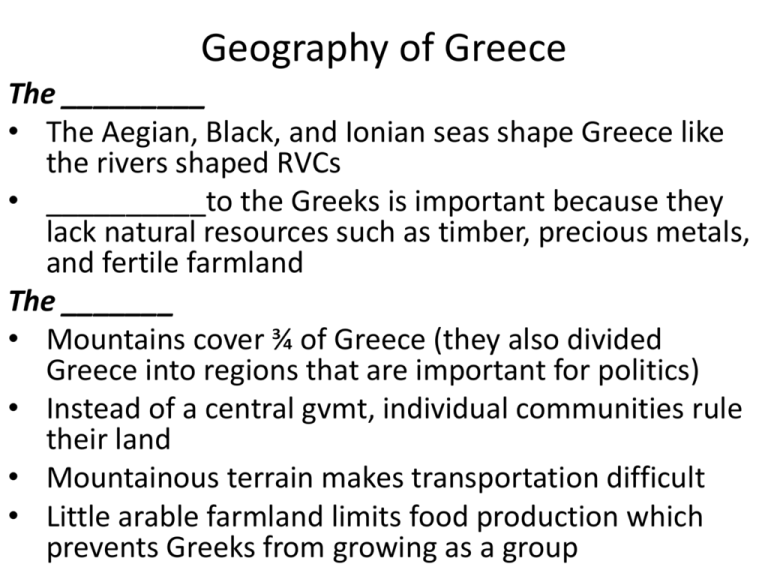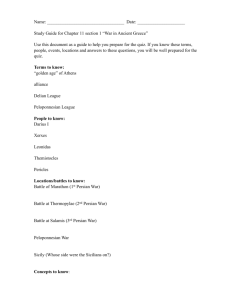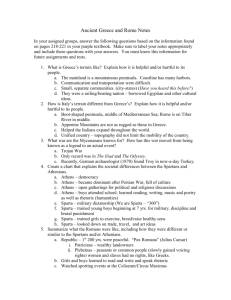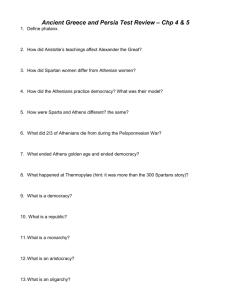5.1 Notes
advertisement

Geography of Greece The _________ • The Aegian, Black, and Ionian seas shape Greece like the rivers shaped RVCs • __________to the Greeks is important because they lack natural resources such as timber, precious metals, and fertile farmland The _______ • Mountains cover ¾ of Greece (they also divided Greece into regions that are important for politics) • Instead of a central gvmt, individual communities rule their land • Mountainous terrain makes transportation difficult • Little arable farmland limits food production which prevents Greeks from growing as a group The __________ • Greece has a varied climate (48-80 degrees) • Creates _______________—men often meet to discuss public issues, exchange news, and be civil Mycenaean Civilization • One of the migrant Indo-Euro. Groups arrives in Mycenae (southern Greek city that was fortified) • Wall prevented nearly any attack • The Mycenaeans come into contact with _________and begin to value trade. Minoans also share their writing system and art with Mycenaens • Minoans influenced Greek religion, art politics, and literature • Westernized civilization begins here! ______________ • During the 1200s BC, the Mycenaeans fight a decade long war against Troy (pg. 124) • Legend says Greeks attack Troy because Trojan prince kidnaps Helen, the wife of Greek king • One of the last Mycenaean battles Greek Culture Declines under Dorians • Shortly after Trojan war, Mycenae falls due to attacks from sea raiders (around 1200 BC still) • The Dorians move in, but are fall less innovative than Mycenaeans causing its fall… it’s important to know that they lost the ability to ________! (pg 125) ______________ • Without writing, Greeks (Dorians) are forced to tell stories by mouth. One story-teller is Homer. • _____________is one epic poem that Homer tells and it’s about the Trojan War. (around 750-700 BC) • The heroes of the poem are ___________(Greek) and ___________(Trojan) • https://www.youtube.com/watch?v=NQ62frK74u0 Greeks Create Myths • The works of Homer and Hesiod (Theogony) seek to explain the mysteries of nature and power of human passions (changing of seasons, etc.) • Greeks attributed human qualities (love, hate, jealousy) to their gods, but their gods were immortal • _______-ruler of the gods. Wife is _______, daughter is _______(ruler of the cities; names Athens) Warring City-States • Rule has changed by 750 BC from tribal/clan rule to rule of the city-states (polis) • Typically home to fewer than 10,000; control 50-500 square miles; and the acropolis is the market where citizens discuss gvmt Greek Political Structures • Different city-states used different gvmts. 1. Monarchy- ruled by one king 2. Aristocracy- rule by small group of noble families who previously served a king 3. Oligarchy- rule by various powerful people Tyrants Seize Power • Tyrants emerged as a result of clashes between rulers and common ppl. Not looked as they are today, and built programs to provide jobs and housing for their supporters. Athens builds a Limited Democracy • In Athens people directly participate in government, moving towards a democracy Building Democracy • Draco takes over in Athens, and est. his legal code in which rich and poor were equal (harsh toward criminals) • Solon comes to power thirty years later (594 BC) and gets rid of Draco’s debt slavery idea. He organizes people into four classes, and only four from the top can hold office. All can participate. • 100 years later (500 BC), Cleisthenes breaks up four classes of wealth into ten classes based on where you live. Created the Council of 500, who counseled the assembly. In addition, he allowed citizens • to propose laws to the assembly • *only free adult male property owners were considered citizens Athenian Education • Only sons of nobility were formally educated • Began around age 7 • Studied reading, grammar, poetry, history, math and music. (also public speaking and athletics) • When older, boys went to military school • Girls educated @ home about giving birth, weaving cloth, cooking, and skills to be wives/mothers • Women were essentially restricted to the house Sparta builds a Military State • Located in Peloponnesus (pg. 121) • Polar opposite of Athens https://www.youtube.com/watch?v=ogc1FMgpoo4 Sparta Dominates Messenians • Around 725 BC, Spartans invade Messenia and defeat Messenians and make them helots (took ½ their crops annually) • Messinians revolt and almost win. Spartans realize their need for more strength. Sparta’s Gvmt and Society • • • • Made of several branches (all Spartan “citizens”) Assembly elected officials who vote on issues Council of Elders- propose laws to the assembly Five men carried out the laws passed by assembly, and two kings controlled the military of Sparta • Social Classes 1. Ruling families who owned land (original inhabitants) 2. Noncitizens who were free 3. Helots- captured Messenians (worked in fields or as servants) Spartan Daily Life • Forms of expression discouraged (no arts, literature, or music). • Spartans valued discipline, strength, and duty rather than freedom, beauty, and learning • Children begin army training at 7 and serve until they’re 60. Their life was the military. • Girls even trained and wrestled, and ran the homes while men were fighting (more freedoms than Athens) • Sparta was more valued than family and anything else. Persian Wars New Army Emerges • Iron replaces bronze and allows lower classes to fight alongside wealthy. These fighters develop idea of a phalanx Battle at Marathon • Ionian Greeks and Athenians join forces against Persia • Darius the Great defeats them and vows to destroy Athens • 490 BC- a Persian fleet of 25,000 men cross Aegean Sea in Marathon. 10,000 Athenians defeat Persians because they’re discipline and use phalanx. (Persians retreat after losing 6,000) Pheidippides Brings News • With the Athenians in Marathon, Athens is defenseless. Army leaders choose Pheidippides to run back to Athens (26 miles away) and spread the news. He gives the news, collapses and dies. The Greek army hurriedly moves to Athens, and their preparedness forces Persian fleet to retreat once again when they arrive in Athens harbor. Thermopylae and Salamis • Decade later (480 BC) Darius the Great’s son Xerxes invades Athens. Division among Greeks makes moving down the coast of Greece easy. • Xerxes meets opposition at Thermopylae- 300 Spartans are blocking a mountain pass. Spartans held off 7,000 Persians for three days, allowing other Greek forces to retreat. 300 die, but make a valiant effort. • Athenians decide to burn Athens and resort to sea warfare and were successful even though out numbered once again. Ships with battering rams puncture the hulls of Persian ships Golden Age in Greece • Pericles leads Athens with three goals 1. Strengthen Athenian democracy 2. Hold and strengthen the empire 3. Glorify Athens • • • • Increases # of ppl who are paid salary Est. a DIRECT DEMOCRACY Strengthens Athenian navy Uses $ from Delian League to beautify Athens (marble, gold, ivory) Art and Architecture • Phidias is hired by Pericles to build the Parthenon • Art idealized the human body in motion (idealism was more important than realism) Drama and History • Tragedy (Sophocles, Euripides, and Aeschylus) and comedy (Aristophanes) plays • No written records • Thucydides uses past events to understand the present Athenians and Spartans go to War • 431 BC the two go to war because Athens’ prosperity created hostility Peloponnesian War • Athens has best navy, Sparta is better with the army • Spartans burn food supply, and Athenians have to import food. • Plague hits Athens and kills Pericles… Both sides sign a truce in 421 BC • 415 BC Athens invades Syracuse, Sicily (Spartan ally) and Spartans completely devastate Athenians. They lost all money, power, and the empire itself Philosophers search for Truth • After the war, Athenians question their values • Great thinkers emerge (philosophers) • Sophists- groups of thinkers who thought “man” was the measure of all things (no absolute standard) 1. Socrates- believes in universal order; found guilty by the court of “corruption” and forced to drink hemlock 2. Plato- student of Socrates; believed in a social system comprised of artisans/farmers, warriors, and rulers 3. Aristotle- invented a method of arguing according to rules of logic. Competitor to Plato Alexander’s Empire Philip Builds Macedonia • King Philip II rules in Macedonia 359 BC (pg 142) • Philip (23 years old) uses phalanx to conquer opponents, and envisions conquering Greece • Philip defeats divided Greece @ Battle of Chaeronea---Greece under Macedonian rule • Never got chance to conquer Persian because he was murdered by former guard @ daughter’s wedding. His son, ALEXANDER THE GREAT, takes over the kingdom Alexander defeats Persia • Takes over empire @ 20, but is well qualified • Thebes (Greek) rebels, he burns the city killing 6000 • Alexander leads 35,000 into Anatolia– defeats 40,000 Persians • Persian King Darius III raises an even larger army… Alexander has to change game plan and controls Anatolia (ends up forcing Darius to flee) Spread of Hellinistic Culture • Hellinistic Culture is Greek (Hellinic) culture infused with Persian, Indian, and Egyptian culture • Alexandria emerges as the center of Hellinistic culture and trading (location on the Nile) • Alexandria was attractive physically. The library and museum brought in visitors • Pharos Lighthouse- lighthouse over the harbor that mirrored a burning fire from the top Science and Technology • Astronomy- Aristarchus concludes that the sun is 300 times larger than Earth, and also that the planets revolve around the Sun. Eratosthenes calculates the circumference between 28,00029,000 miles (actually 24, 860) • Math- Euclid comes up with Elements. Archimedes estimates the value of pi and law of lever. • Philosophy/Art1. Stoicism- ppl should live virtuous lives in harmony with God 2. Epicureanism- live in harmony with the mind and body (no account for deities)






